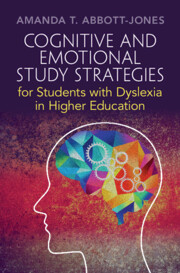Book contents
- Cognitive and Emotional Study Strategies for Students with Dyslexia in Higher Education
- Cognitive and Emotional Study Strategies for Students with Dyslexia in Higher Education
- Copyright page
- Dedication
- Contents
- Figures
- Preface
- Acknowledgements
- Preview of the Contents of the Book
- 1 Introductory Chapter: Dyslexia and Difficulties with Study Skills
- 2 Organisation Techniques and Meeting Deadlines
- 3 Note-Taking Strategies
- 4 Reading Strategies
- 5 Making Learning Memorable
- 6 Essay-Writing Strategies
- 7 Spelling Techniques
- 8 Revision and Examination Techniques
- 9 Presentation Techniques
- 10 Public Speaking, Interviews, Seminar Discussion and Debate Techniques
- 11 Emotional Coping Techniques and Looking After Your Wellbeing
- Epilogue
- References
- Index
2 - Organisation Techniques and Meeting Deadlines
Published online by Cambridge University Press: 14 September 2023
- Cognitive and Emotional Study Strategies for Students with Dyslexia in Higher Education
- Cognitive and Emotional Study Strategies for Students with Dyslexia in Higher Education
- Copyright page
- Dedication
- Contents
- Figures
- Preface
- Acknowledgements
- Preview of the Contents of the Book
- 1 Introductory Chapter: Dyslexia and Difficulties with Study Skills
- 2 Organisation Techniques and Meeting Deadlines
- 3 Note-Taking Strategies
- 4 Reading Strategies
- 5 Making Learning Memorable
- 6 Essay-Writing Strategies
- 7 Spelling Techniques
- 8 Revision and Examination Techniques
- 9 Presentation Techniques
- 10 Public Speaking, Interviews, Seminar Discussion and Debate Techniques
- 11 Emotional Coping Techniques and Looking After Your Wellbeing
- Epilogue
- References
- Index
Summary
Effective organisation techniques and the ability to break down larger projects into a series of more manageable time framed steps are key to student progression and success. Competent organisation skills help to overcome academic weaknesses and abilities in time management can alleviate negative emotion, such as stress around study tasks. As such, this chapter told from the dyslexic learners’ perspectives provides advice on developing proficient organisation strategies. These include developing systems to control events, using technology, using plans, daily to-do-lists, and making timetables into visual posters to display on walls. Visual examples of different types of academic calendars, timetable templates and to-do-lists are provided so that the reader can select methods suitable for how they work, and advice on using organisation to maintain motivation and prevent procrastination of work is supplied. Meeting deadlines and multitasking on several assignments due at the same time are anxiety provoking experiences for students with dyslexia, so guidance on ways to cope with this, such as using support networks for encouragement and motivation, starting work on assignments early in the term to meet deadlines, and identifying and breaking down tasks into smaller components by imposing self-made goals to make the work more manageable is presented.
Keywords
- Type
- Chapter
- Information
- Cognitive and Emotional Study Strategies for Students with Dyslexia in Higher Education , pp. 36 - 73Publisher: Cambridge University PressPrint publication year: 2023



